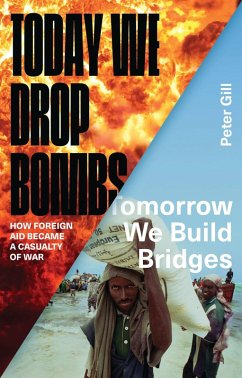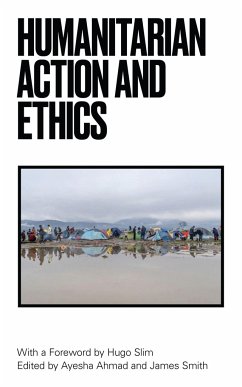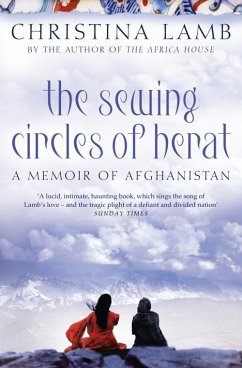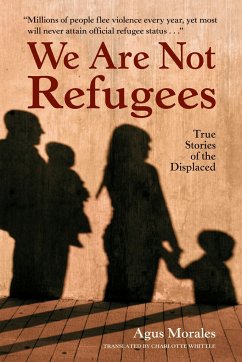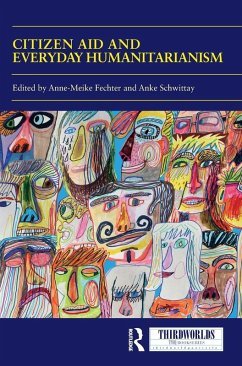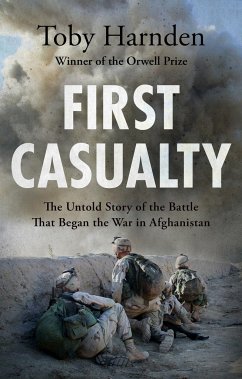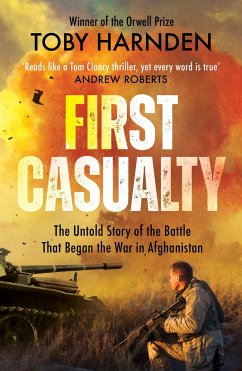Peter Gill
Broschiertes Buch
Today We Drop Bombs, Tomorrow We Build Bridges
How Foreign Aid became a Casualty of War
Versandkostenfrei!
Versandfertig in 2-4 Wochen
Weitere Ausgaben:

PAYBACK Punkte
13 °P sammeln!





Eye-opening and controversial, Peter Gill reveals first-hand the dilemmas of providing foreign aid at the sharp end.
Peter Gill is a journalist specialising in developing world affairs. He has been South Asia and Middle East correspondent for the Daily Telegraph and has travelled widely in Africa and Asia as a current affairs reporter for ITV, the BBC and Channel 4. He covered the fall of Saigon for the Daily Telegraph and made three documentary films on Afghanistan during the Soviet occupation. He led major media campaigns to combat AIDS and leprosy in India for the BBC, and has written four books on development themes, including a study of Oxfam's early work and two books on the politics of hunger in Ethiopia.
Produktdetails
- Verlag: Zed Books
- Seitenzahl: 320
- Erscheinungstermin: 15. Mai 2016
- Englisch
- Abmessung: 216mm x 134mm x 30mm
- Gewicht: 334g
- ISBN-13: 9781783601226
- ISBN-10: 1783601221
- Artikelnr.: 42835944
Herstellerkennzeichnung
Libri GmbH
Europaallee 1
36244 Bad Hersfeld
gpsr@libri.de
'This is a valuable book...and not only because it appears in the midst of the worst post-war humanitarian crisis in and around Syria. The issue of neutrality informs many of the big debates about aid. The book is full of misery, but full of admiration too for helpers such as the orthopaedic surgeon who leaves the Royal Bolton Hospital on a Friday evening to fly to Turkey, cross into Syria and carry out amputations for two days before returning to work on Monday. What are you going to do this weekend?'
The Times
'Peter Gill shows with shocking clarity a lack of neutrality on the part of aid organizations.'
Times Literary Supplement
'Takes a hard look at the politicization of aid.'
The Times
'Peter Gill shows with shocking clarity a lack of neutrality on the part of aid organizations.'
Times Literary Supplement
'Takes a hard look at the politicization of aid.'
Mehr anzeigen
/>International Committee of the Red Cross
'An indispensible inquiry into our moral health and humanity.'
LSE Review of Books
'[An] urgent and incisive book of reportage ... Gill's deft analysis and reporting provide an enlightening account of a new world disorder, where the "civilized principles supposedly governing a war" have been forfeited.'
Publishers Weekly
'[A] brisk, hard-hitting narrative... Gill's informed, on-the-ground reporting from Afghanistan, Pakistan, Somalia, and Syria demonstrates how Western aid agencies have, through their increasing reliance on government funding, surrendered their independence... Tales of corruption and compromise, of interest to anyone who's ever contributed to a humanitarian aid organization.'
Kirkus Reviews
'[Gill's] analysis of what ensues when charities align themselves too closely with the aims of their governments, as in Afghanistan, is nuanced and piercing...His clear eye is a sure guide through some pretty fuzzy terrain.'
New Internationalist
'Gill weaves his way from Syria to Afghanistan to Pakistan and Somalia, stopping in Geneva to recount the beginnings of the International Committee of the Red Cross and in Paris to learn about the origins of Médecins Sans Frontières (MSF), building up a complex and sometimes disturbing mosaic of experiences good and bad.'
The Tablet
'Peter Gill visits the frontline in some of the most dangerous warzones in the world, and powerfully challenges the concept of benign aid. For anybody who believes in the need for a more peaceful world, this is an essential read.'
Antony Loewenstein, author of Disaster Capitalism: Making A Killing Out Of Catastrophe
'A solid yet very readable analysis of the state of the humanitarian aid industry in the world's current conflicts. And it holds a warning: for true humanitarianism to survive, its fundamental principles need to be reaffirmed. Urgently.'
Linda Polman, author of War Games: The Story of Aid and War in Modern Times
'In this brilliantly written account, Peter Gill bravely documents the tragic consequences of aid agencies and NGOs subordinating themselves to the war on terror. Gill's book eloquently persuades us all that it is past time for a re-affirmation of the values of neutral and politically independent development that respects the rights and wants of the poor as an end in themselves.'
William Easterly, author of The Tyranny of Experts
'A superb book that shines a spotlight into critical but neglected issues. It promises to open up an essential and urgent debate on humanitarian values in today's polarized politics.'
Alex de Waal, author of Darfur, and co-author of Advocacy in Conflict
'With more and more aid money being diverted to serve national security interests, Gill challenges those NGOs that signed up as "force multipliers" for Western governments and got rich on the proceeds. An important book for all those who care about the future of our world.'
John Hilary, executive director, War on Want
'Gill challenges our assumptions about the neutrality of aid in conflict. His book is a must read for anyone concerned about the humanitarian aid business.'
Richard Dowden, author of Africa: Altered States, Everyday Miracles
'I recommend this book highly as in introduction into the complexities of modern conflict and the growing repertoire to respond to the need of suffering human beings.'
Tobias Denskus, Senior Lecturer & MA Program Coordinator Communication for Development, Malmö University
'This is a reasoned and authoritative account.'
Peace Researcher
'An indispensible inquiry into our moral health and humanity.'
LSE Review of Books
'[An] urgent and incisive book of reportage ... Gill's deft analysis and reporting provide an enlightening account of a new world disorder, where the "civilized principles supposedly governing a war" have been forfeited.'
Publishers Weekly
'[A] brisk, hard-hitting narrative... Gill's informed, on-the-ground reporting from Afghanistan, Pakistan, Somalia, and Syria demonstrates how Western aid agencies have, through their increasing reliance on government funding, surrendered their independence... Tales of corruption and compromise, of interest to anyone who's ever contributed to a humanitarian aid organization.'
Kirkus Reviews
'[Gill's] analysis of what ensues when charities align themselves too closely with the aims of their governments, as in Afghanistan, is nuanced and piercing...His clear eye is a sure guide through some pretty fuzzy terrain.'
New Internationalist
'Gill weaves his way from Syria to Afghanistan to Pakistan and Somalia, stopping in Geneva to recount the beginnings of the International Committee of the Red Cross and in Paris to learn about the origins of Médecins Sans Frontières (MSF), building up a complex and sometimes disturbing mosaic of experiences good and bad.'
The Tablet
'Peter Gill visits the frontline in some of the most dangerous warzones in the world, and powerfully challenges the concept of benign aid. For anybody who believes in the need for a more peaceful world, this is an essential read.'
Antony Loewenstein, author of Disaster Capitalism: Making A Killing Out Of Catastrophe
'A solid yet very readable analysis of the state of the humanitarian aid industry in the world's current conflicts. And it holds a warning: for true humanitarianism to survive, its fundamental principles need to be reaffirmed. Urgently.'
Linda Polman, author of War Games: The Story of Aid and War in Modern Times
'In this brilliantly written account, Peter Gill bravely documents the tragic consequences of aid agencies and NGOs subordinating themselves to the war on terror. Gill's book eloquently persuades us all that it is past time for a re-affirmation of the values of neutral and politically independent development that respects the rights and wants of the poor as an end in themselves.'
William Easterly, author of The Tyranny of Experts
'A superb book that shines a spotlight into critical but neglected issues. It promises to open up an essential and urgent debate on humanitarian values in today's polarized politics.'
Alex de Waal, author of Darfur, and co-author of Advocacy in Conflict
'With more and more aid money being diverted to serve national security interests, Gill challenges those NGOs that signed up as "force multipliers" for Western governments and got rich on the proceeds. An important book for all those who care about the future of our world.'
John Hilary, executive director, War on Want
'Gill challenges our assumptions about the neutrality of aid in conflict. His book is a must read for anyone concerned about the humanitarian aid business.'
Richard Dowden, author of Africa: Altered States, Everyday Miracles
'I recommend this book highly as in introduction into the complexities of modern conflict and the growing repertoire to respond to the need of suffering human beings.'
Tobias Denskus, Senior Lecturer & MA Program Coordinator Communication for Development, Malmö University
'This is a reasoned and authoritative account.'
Peace Researcher
Schließen
Für dieses Produkt wurde noch keine Bewertung abgegeben. Wir würden uns sehr freuen, wenn du die erste Bewertung schreibst!
Eine Bewertung schreiben
Eine Bewertung schreiben
Andere Kunden interessierten sich für




